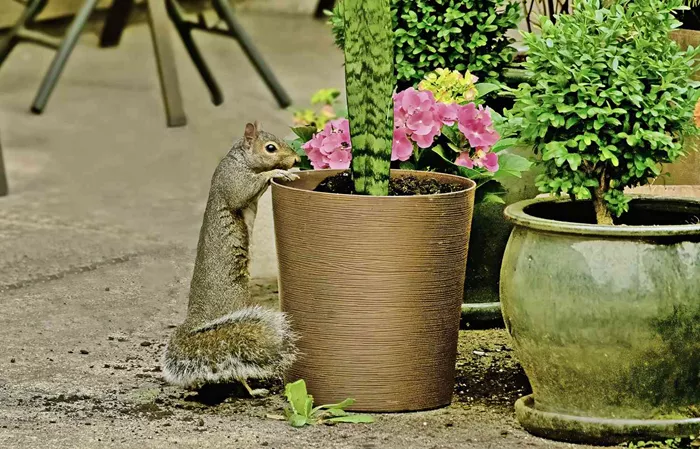Squirrels are charming and lively creatures that often add a touch of nature’s whimsy to our gardens. However, their playful antics can quickly turn into a gardener’s frustration as they dig up bulbs, nibble on tender shoots, and raid fruit and vegetable patches. Protecting your plants from these persistent visitors requires a blend of creativity, natural deterrents, and thoughtful garden design. This article explores effective, humane, and eco-friendly strategies to keep squirrels out of your plants, ensuring your garden thrives while coexisting peacefully with wildlife.
Understanding Squirrel Behavior in Gardens
Squirrels are naturally curious and opportunistic feeders. They are attracted to gardens by the promise of easy food—whether it’s bulbs, fruits, vegetables, or birdseed. Their keen sense of smell helps them locate buried bulbs and ripe produce, while their agility allows them to climb and dig with ease. To effectively deter squirrels, it’s essential to address their motivations: hunger, curiosity, and shelter.
Natural Repellents: Harnessing the Power of Scent and Taste
One of the most effective ways to discourage squirrels is to use natural repellents that target their sensitive noses and taste buds.
Hot Peppers and Capsaicin: Squirrels detest the heat of capsaicin found in cayenne and chili peppers. Sprinkling cayenne pepper flakes around plants or mixing a spray from hot sauce, water, and a few drops of dish soap can create a potent deterrent. Apply the spray carefully in the early morning or evening to avoid harming beneficial insects and always wear gloves and eye protection during application.
Essential Oils: Scents such as peppermint, geranium, and clove are unpleasant to squirrels. Cotton balls soaked in these oils placed around garden beds or planters can help keep squirrels at bay. Peppermint oil mixed with petroleum jelly and rubbed on plant stems is another effective method.
Garlic and Vinegar Sprays: Garlic’s pungent aroma is disliked by squirrels. A homemade spray combining chopped garlic, water, and vinegar can be applied to fences and pots (avoiding direct contact with plants to prevent damage). These sprays need regular reapplication, especially after rain.
Coffee Grounds and Other Scents: Used coffee grounds sprinkled on soil or mulch create an unpleasant environment for squirrels. Other scents like cinnamon, white vinegar, and even Irish Spring soap have been noted to repel squirrels, though their effectiveness varies.
Physical Barriers: Protecting Plants and Bulbs
Creating physical barriers is a direct and reliable way to keep squirrels away from your plants.
Row Covers and Netting: Lightweight row covers, bird netting, or chicken wire can shield vulnerable crops and bulbs. For bulbs, lining the planting area with hardware cloth or chicken wire buried about a foot deep prevents squirrels from digging them up. Cover the mesh with soil and mulch to allow shoots to grow through while keeping squirrels out.
Enclosures and Greenhouses: Building a small enclosure with chicken wire or even a greenhouse can protect high-value plants from squirrel damage.
Mulching with Gravel or Aluminum Foil: Squirrels dislike walking on rough or unusual textures. Using gravel mulch or laying aluminum foil over bulb beds can deter digging and disguise the scent of bulbs.
Squirrel-Proof Bird Feeders: Since bird feeders attract squirrels, using feeders designed to exclude them or adding baffles can reduce their presence near your garden. Position feeders away from launch points like trees or fences and keep the area clean of spilled seeds.
Garden Design: Using Plants Squirrels Avoid
Incorporating plants that squirrels find unappealing can create a natural barrier in your garden.
Squirrel-Repellent Plants: Marigolds, nasturtiums, mustard, mint, alliums (such as daffodils, snowdrops, and hyacinths), and citronella are known for their strong scents or tastes that squirrels avoid. Interplanting these with more vulnerable species can reduce squirrel visits.
Avoid Attractive Bulbs: Some bulbs like tulips and crocuses attract squirrels, so it’s better to plant varieties they dislike or surround bulbs with repellent plants.
Behavioral Deterrents: Startling and Distracting Squirrels
Squirrels are wary of sudden disturbances and certain stimuli.
Motion-Activated Sprinklers: These devices spray water when motion is detected, startling squirrels and encouraging them to avoid the area. This method is humane and also waters your plants.
Decoys and Noise Makers: Placing plastic owls, rubber snakes, or reflective objects like pinwheels and shiny tape can discourage squirrels. Moving decoys regularly and adding noise elements increase their effectiveness.
Providing Alternative Food Sources: Some gardeners find success by offering squirrels their own feeding area away from prized plants. Feeding them sunflower seeds, peanuts, or planting extra tomatoes can reduce their interest in your garden, though this method may attract more squirrels if not managed carefully.
Maintaining a Squirrel-Unfriendly Environment
Cleanliness: Keep your garden tidy by removing fallen fruit, cleaning up seed spills, and securing trash bins. Reducing food availability discourages squirrels from frequenting your garden.
Pruning and Placement: Trim tree branches away from your house and garden structures to reduce easy access points for squirrels to jump into your garden or onto bird feeders.
Humane and Eco-Friendly Commercial Options
For those seeking ready-made solutions, commercial repellents made from natural ingredients, including predator urine scents, are available. Products like Nature’s Defense use non-toxic, eco-friendly formulas to create protective barriers that squirrels find unpleasant without harming them or the environment.
Conclusion
Keeping squirrels out of your garden is a balancing act between protecting your plants and respecting the wildlife that shares your outdoor space. Combining natural repellents, physical barriers, strategic planting, and behavioral deterrents creates a comprehensive defense that is effective and humane. By understanding squirrel behavior and using eco-friendly methods, you can enjoy a thriving garden free from unwanted nibblers while maintaining the pastoral charm of your green sanctuary.
This harmonious approach ensures that your garden remains a vibrant, peaceful retreat where both plants and nature’s creatures coexist beautifully.


